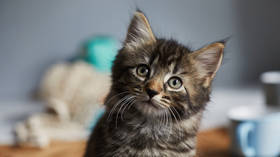Domestication made cats’ brains smaller, scientists find

A study published in the Royal Society Open Science Journal on Wednesday has confirmed scientific suspicion that animals domesticated by humans experience a shrinking in brain size. European and African wildcats both have larger brains than the housebound felines we keep as pets.
Researchers for decades have argued that domestication shrank cat brains, with several studies in the 1960s and 1970s comparing brain sizes between domestic cats and their wild ancestors. However, the latest study compared modern wildcats with modern house cats and came to the same conclusion.
"Our data indicates that domestic cats indeed, have smaller cranial volumes (implying smaller brains) relative to both European wildcats (Felis silvestris) and the wild ancestors of domestic cats, the African wildcats (Felis lybica), verifying older results," the researchers explained in their new paper.
Furthering their argument that domestication was the cause of this change, they described how hybrids of domestic cats and European wildcats “have cranial volumes that cluster between those of the two parent species."
Domestication and its consequences have been a disaster for other animals too, with sheep, dogs, and rabbits all experiencing shrinking brains as we domesticated them. On the other hand, domestication has decreased aggression and the will to wander in these animals, making them more useful to humans, for example as working companions in the case of dogs.
Human brains have also shrunk in the past 3,000 years, although scientists have not conclusively linked this change with our gradual slide to self-domestication and sedentary lifestyles.
Some scientists argue that cats are only “semi-domesticated,” and that their relationship with humans is beneficial only to the cats. However, the researchers refute this claim, pointing to their usefulness in keeping grain harvests safe from rodents, and our tendency to favor docility when breeding them.
There are currently somewhere between 200 and 600 million tame cats in the world, making them the world’s most popular household pet. According to figures from Dalia Research, a German firm, Russians are the most cat-crazy people in the world, with 59% owning a feline companion.














